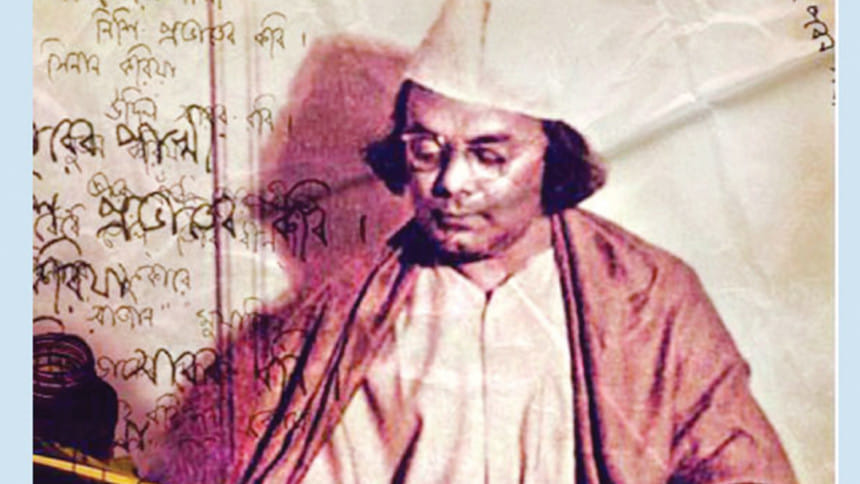Nazrul’s Nonfiction Prose and the Question of Human Emancipation

1
Kazi Nazrul Islam (1899-1976)—one of the greatest Bengali poets—has by now been fully assimilated into the literary canon and even into public discourse in Bangladesh. He has been appropriated and institutionalized at more levels than one, as Nazrul remains the "national" poet of the country. But the canonization and institutional invocation of Nazrul have also run the risk of relaying and repeating certain run-of-the-mill characterizations of the poet—ones that do not do justice either to the content or to the scale, scope, and range of his work.
For instance, Nazrul is routinely commended as a "rebel poet," although—by his own admission—he is not only a rebel but also a revolutionary poet. Elsewhere I've already written about how Nazrul is fundamentally a revolutionary, while also underlining the prodigious range of his preoccupations—both literary and non-literary. A poet and a musician in the first place, Nazrul was also a short story writer, novelist, playwright, essayist, theorist, translator, film-maker, editor, journalist, even a drummer, and an actor. Nazrul knew at least six languages and even sporadically wrote lyrics in both Hindi and Urdu. He was a political activist and even a founder of a political party to boot.
Over the years numerous works on Nazrul have been produced. Some of them are surely important and interesting. Yet many areas of Nazrul's works have remained unexplored or relatively unexplored. One such area, I submit, is his nonfiction prose. I argue that Nazrul's nonfiction prose instructively reveals his poetics, politics, philosophy, and praxis all at once. I also argue that his prose is not only performative but also insurgent and even insurrectionary. He makes us see what the feminist musician Ani DiFranco said once: "Every tool is a weapon if you hold it right."
Let me, then, briefly map out the terrain of Nazrul's nonfiction prose. It encompasses hundreds of his editorials, short articles/essays, notes, letters, and even speeches, spanning a period from 1920 to 1940. But Nazrul was most active in this genre throughout the second decade of the last century. Some of Nazrul's major works of nonfiction prose include his four books—Joogbani, Dhumketu, Durdiner Jatree, and Rudramangal. They are mostly collections of the editorials and short essays Nazrul had written for the daily Nabajoog and the biweekly Dhumketu. And Nazrul edited both of them with exemplary commitment and conviction as well as with oppositional rage and rigor. Nazrul also wrote a great deal of nonfiction prose for two other magazines—the weeklies called Langal and Ganabani—ones that Nazrul himself edited.
In fact, Nazrul was passionately involved in the editing of Langal. Fully devoted to the causes of peasants and workers, Langal was a mouthpiece for Nazrul's own Labor Swaraj Party. This weekly published not only some popular works on Marx and Lenin but also works by Chittaranjan Das and Subhas Chandra Bose, among many others. Saumyendranath Tagore—a communist activist, Nazrul's close comrade, and Rabindranath Tagore's grand-nephew—was the first translator of The Communist Manifesto into Bengali. Nazrul serially published Saumyendranath's translation in Langal.
Further, Nazrul contributed to other newspapers and magazines, the number of which, according to one estimate, exceeds even 100! In other words, Nazrul's nonfiction prose can by no means be dissociated from his relentless interventions in the field of journalism—oppositional, insurrectionary, mass-line journalism, that is. We would do well to remember that six of his books of both poems and nonfiction prose were banned by the British colonial government in India—an unprecedented event in the history of the world. Those books were banned not only because his voice was insurrectionary but also because his voice was powerful and popular.
2
Indeed, throughout 1920, Nazrul wrote for the daily Nabajoog scores of fierce editorials, taking to heart—so to speak—the revolutionary imperative Karl Marx registered once: "[…] rub your conceptual blocs together in such a way that they catch fire!" In his editorials Nazrul mobilizes powerful poetic metaphors and vivid images in order to make his points about society, politics, culture, and history, among other things. In fact, Nazrul effectively blurs the borderlines between an editorial and an impassioned prose-poem, inaugurating an exciting chapter in the history of editorial journalism.
Take, for instance, "Nabojoog"—the first editorial-turned-essay in his book Joogbani—a piece in which the poetic and the political and the philosophical exemplarily intersect, attesting to Nazrul's distinctive rhetorical éclat and elan. Taking emancipation itself as the ontological basis of humanity, Nazrul poetically invokes—in that editorial—the trinity of his favorite revolutions such as the Irish Revolution, the Turkish Revolution, and, above all, the Russian Revolution of 1917 in order to issue a call-to-action for people's liberation from colonial rule in India.
Later, in 1922, in the pages of Dhumketu, Nazrul openly and publicly raises and declares—for the first time in the country's history—the demand for the full independence of India from British colonial rule. But at that time Gandhi and his acolytes wanted to remain merely content with the dominion status of India. Nazrul remains consistently critical of this position in his nonfiction prose and even in his humorous, satirical pieces. I should note parenthetically: Nazrul boldly politicizes humor, wit, irony, and, above all, his satirical enunciation in his nonfiction prose, making the point that the question of style is not only an aesthetic question but also a political one.
The dialectical interplay between the aesthetic and the political in Nazrul's nonfiction prose remains indivisible from the question of human emancipation which continues to constitute Nazrul's overarching theme throughout much of his nonfiction prose. Nazrul later comes to constellate his insistence on the full independence of India with the question of the total emancipation of humanity in his essay called "Mushkil,' lending credence to his brand of revolutionary humanism and robust internationalism, while also anticipating certain insights of some of the well-known third-world theorists and activists such as the African Marxist revolutionary Amilcar Cabral and the Caribbean anticolonial revolutionary Frantz Fanon, for instance.
Within the thematic horizon of human emancipation, one can surely locate an impressive range of issues and concerns Nazrul dwells on in his nonfiction prose. For instance, Nazrul—as early as the 1920s—writes in his essay called "Sangskritir Charcha" [The Practice of Culture] about what Fanon later calls the "perverted logic of colonialism" and about how people deeply and even unconsciously internalize colonialist values. The African writer Ngugi wa Thiong'o—in his Decolonizing the Mind (1986)—theorizes how the mind itself comes to be colonized, and he accentuates the need for decolonizing it. Nazrul clearly anticipates Ngugi. Nazrul calls attention to both the land and the mind—sites that are colonized—while urging us to emancipate them, although Nazrul does not use the term "decolonization" as such.
But Nazrul repeatedly deploys the phrase "mental slavery"—moner golami—reminding one of the Jamaican singer Bob Marley's "Redemption Song": "Emancipate yourselves from mental slavery/ None but ourselves can free our minds!" Astonishingly, Nazrul even makes an appeal to the "unconscious" in Dhumketu back in 1922: "Rise, ye unconscious! Know yourself!" He seems to be hinting at what might be called the ideological unconscious of the colonized subject.
No doubt Nazrul's nonfiction prose establishes him as a major anticolonial revolutionary, whose concerns with the four sites of anticolonial struggles—land, labor, language, and the body—remain deeply pronounced throughout his oeuvre. Nazrul shows—in various contexts and configurations—how those four sites (including the body which, for Nazrul, surely involves the mind against the grain of the Cartesian mind/body split) remain colonized. But he writes about quite a range of other issues as well.
Some of Nazrul's subjects then include: the need for recuperating our own cultural and conceptual resources; the radical notion of non-hierarchical mass leadership, as Nazrul says: "Who's your leader? Your conscience is your leader, your sense of responsibility is your leader!"; the need for confronting and combatting all forms and forces of oppression as the proof of our sense of humanity; music as performance or praxis; the politics of world literature and literary universalism; education and curriculum; and the marginalia of the everyday, as he delineates the contours of the social topology in his nonfiction prose.
Also, Nazrul writes not only about communalism—one of his predominant themes—but also about racism way more competently and passionately than any creative writer in Bengal during his time. His understanding of "communalism" as being both structural and deeply "internalized" is simply remarkable. The question of racism is particularly taken up in his piece "Kaala Admeeke Gooli Mara" [Shooting Black Folks]. Nazrul clearly sees the dialectic between colonialism and racism; he sees—almost like the Caribbean Marxist CLR James—how racism turns out to be colonialist and colonialism in turn racist. Nazrul even evinces a revolutionary ecological consciousness as early as 1920. Mark, then, Nazrul's Englesian pronouncement: "None can ever achieve a victory by waging war against nature."
In his ecologically engaged piece "Roj Keyamat Ba Proloy Din" (1920), Nazrul zeroes in on the environmental dangers of coal-excavating projects—ones that persist with a vengeance in the era of disaster capitalism today. Nazrul even foresees our times of environmental and economic crises, systemically produced as they are. In some ways, Nazrul also speaks to our coronavirus-ridden global conjuncture that has exposed class-race-gender inequalities, to say the least. And, true, Nazrul never loses sight of the sources and systems of oppression. More clearly in his nonfiction prose than anywhere else, Nazrul seeks to identify and dismantle these four interconnected systems of oppression—capitalism, colonialism, racism, and patriarchy—in the interest of nothing short of the total emancipation of humanity.
Given space constraints, I think I have merely scratched the surface of Nazrul's nonfiction prose, meaning that it calls for further exploration in a world where the question of human emancipation is more relevant than ever.
Azfar Hussain teaches in the Integrative, Religious, and Intercultural Studies Department within the Brooks College of Interdisciplinary Studies, Grand Valley State University in Michigan, and is Vice-President of the Global Center for Advanced Studies, New York, USA.

 For all latest news, follow The Daily Star's Google News channel.
For all latest news, follow The Daily Star's Google News channel. 



Comments